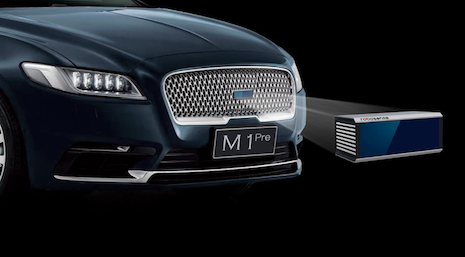Chinese ecommerce giant Alibaba is investing in logistics services that could drastically alter luxury goods delivery, as mailing service in China gets exponentially busier and shipping in the United States lags.
The company has stated that it will invest $15 billion in logistic services by 2023 with plans for a smart warehouse and delivery hub. Working with autonomous driving developer RoboSense, Alibaba has created an unmanned logistics vehicle, as part of its effort to create driverless delivery.
“Delivery in the U.S. and Europe will be faster and lower cost,” said Mark Qiu, chief operating officer at RoboSense. “In China, mailing volume is growing everyday to more than 100 million parcels per day, making traditional delivery methods increasingly difficult.
“Plus consumers’ demands for quick delivery turnarounds are growing, making free next day delivery or even same day delivery more and more commonplace in China,” he said. “In the U.S. and Europe, however, standard delivery currently takes three to seven days, and if you want express or next day delivery, you often have to pay almost double.”
Delivering innovation
Alibaba, which is known as an innovator in retail, is hoping to make delivery unparalleled.
In addition to Alibaba’s new logistics hub, located in the Hong Kong International Airport, the ecommerce platform has partnered with Emirates Airline for cross-border logistics.
Emirates’ freight arm of its business will be responsible for cross-border delivery for Alibaba.

Alibaba also innovated with car buy by unveiling a vehicle vending machine. Image credit: Alibaba
A 1.7 million-square-foot park is also set to open outside of Shanghai, which will host smart warehouses using IoT, robotics, artificial intelligence and digital processing to make delivery processes more efficient.
These new initiatives are not only to help innovate consumer-facing delivery systems, but also work internally to make its business more streamlined and cut costs.

RoboSense works on autonomous features at large scale. Image credit: RoboSense
“Alibaba’s Cainiao Network and RoboSense plan to implement full-scale production of commercial unmanned logistics vehicles by the end of this year, reducing cost and speeding up delivery,” Mr. Qiu said. “RoboSense’s MEMS solid-state LiDAR is the primary solution to lower the cost for unmanned driving, with high stability, high resolution and low cost.
“The cost of RoboSense’s LiDAR for a single driverless delivery vehicle adds up to only a few hundred dollars versus thousands of dollars with traditional approaches,” he said.
Alibaba forward thinking
It is not just logistics that Alibaba is looking into the future for. It is innovating in a variety of sectors with numerous investments and partnerships.
The Chinese ecommerce giant also recently worked with the Institute of Textiles and Clothing from the Hong Kong Polytechnic University to create an artificial intelligence program that can recognize and categorize fashion images based on certain attributes.
The joint project seeks to create an artificial intelligence that will be able to be fed images of high fashion and learn to categorize them based on factors such as fit, color or type of apparel. In doing so, Alibaba is hoping to get a better understanding of how customers shop for fashion as well as serve them more personalized suggestions based on the AI’s input (see story).
Alibaba’s Luxury Pavilion is helping brands deliver experiences and services to top customers through the launch of a loyalty program.
Launched last year, Luxury Pavilion today sells merchandise from almost 50 luxury brands, including Burberry and Maserati. Through the newly created Luxury Pavilion Club loyalty program, shoppers will gain access to perks such as exclusive offers, celebrity events and door-to-door returns (see story).
“Alibaba Group has committed to investing 100 billion yuan (approximately $15.5 billion) in building China’s intelligent logistics network, and Alibaba’s Cainiao Network with RoboSense just announced the plan to produce 100,000 G Plus driverless delivery vehicles in three years' time," Mr. Qiu said. "This collaboration will propel the unmanned logistics vehicle market to explosive growth in the coming years.”
{"ct":"1o2hb9qwF9RJ4uCf5mUP3qTAro8W3xMOZbZsX9vIeBM0chzrtRZQnN4toO2jr+0ww2VjwmeW+7Cb6Bgf5nL34rl25AFn+1NQkKgnOgZ2jtDfsMw+ZowsQv0R10n338JNHES99q0sU2Ug8UkMGK5qIqRPodRmlZSTD3GuxuzkSAue7KGvtdVZqqddmItnIrDJT4HB8oE2rj5YK46XlEAm4XkEAVEBgaX5yW\/\/3tZa1FyfRh4XoJjfToAHs+9Wlev3W4qPHumJ4Y22ncMxz0amz5Pn2t8zFVwHD2awzUQgLLOWR98mzzF752qpnNRQnJpaTZWeXRYXuwUgeN+fzOOM8sEkYB284l5FgY14Um2bNZEuOEfHZVuOuq+SyMXET1rMMi0bYLuuNN998QveRLE14FIgLWEhYFOlZMrMZ29dTS1DgJPQVdNFREvZW0nZEzBpcSRRPgUSSUFnbLpXFHhvc3hoXY4phbc+b7u2heFh25M\/hBzG8tmMSN1TZxqyHnIjPXP3zWLm11OhPKa2+SmtPGAG+dhIXubCz4SZ6QqYvIRCo3DqkAoi4twzF2FZDIosnyilAbzAJ5oUQiA9ImhydXtIkCKjoP4bfZO69+dPAIC64ChVtimD2HVoPDfJx8652IHhj+4nwMYp1zT1cUQDWdaR\/TqQ9FurQU5xoiJPSBO0pXJV9nYWQS4dAGlISuClWQIxQisWvaZ6tquEG4qB+idgwtr0ybnmUwq0vaKBW8W0+rUTHJnRilvEawmSBokeb6aHGTdBZ96KWiuemusbUuSS\/TzpvEFRY2ggevIN0oM8XwoBJpc1I\/wJBLH6EqEZn5o6Lh9Fnxw24exQWTpK5viOebx\/G1lOzgFXGamH55GnQq1fFyVzW2Ajn6tneq+Q\/MkSeaU6g37DRKO6SIlHedTGM8luvt8dIHY+OHFSJaUww++ukfFzV\/\/ulfU927zivla8OfXq51PT0NVsbtfeG74MmTogJkAONSu1drlVYwbc+GfTL4gJ7lV174NKW\/jpH2J\/I9am1R5F4okVPQjN29yHqVr79EBf8jXBLRr+0FO3AZ7A78\/25EusOng5mZmUc0cYShx6DoP8QtSk7\/pQNlJl5HL2NUKKmWVFhKrVmyibGc0JZFJMNWGIiajl1evamIJYcDcAKK5I0VXKNN8UBN7OmCZp0BO+fqLZBjZWOwsKgk3eob5F5nS+PRpan+2\/gGMBnCiMNAsxyfGTtUxSvs5QS1CE8hSEHgCzStw1jfEjUZaCv\/C7xQ78WbNqpAefKSo2mfgZan7KYVIaB5blAb8CqfLlsddUvqH+DblUkpwh3NUj6SJJQtyxVTyxlq5jyLM1jp7QrGSHDeRdHuLltC07ztE89RTyx2+MR45lQsNZrakfQl6lck2AdMFRdl9jte7eaBdZWlg2G6Yr43\/sFZbL9lrr\/eE0OfkG18BxDBnITXOHBaQiNas0SGYzvDkBsgUqqNSka2I9zH0txkVmXNtjP+1mzg2TrBR9ztiDvNmFNrkUzy2Sz+I+ujk0cxEtC4mrmaCDcgo+pmw0AAdNYp\/BvyFlMlKWMwkqttHKEP6ePHXMEP5VQ1GeEA8qnolRqlbbYF\/Woj\/3fsDdWKZ2N9LrTyvfof5w8kHXBI1ehYuCPYthDRTvmk+oTuGshg6zggAN1G5hkEHsLUaSKI7fOJ727SzRz1peJy7f4ZMPoNIml7VhpszTlCHBIJz\/6n3wSrmio4f7ZRdE5zU\/XoUyq0JNLnMD41myERlx4XWdMsT1vihfBxtK08wbNgk+RFDN4uPj6pu6jhxLBoqehQuQYY37bXaqL0VBPHxBQ2r2\/pLSEW+6U5zoEm3vw7M7t\/x\/qhWGLxuv0Wc31aUslOf+exPcn4Wei5Ut8Gyc+zBkiyr\/VN+edAowMsLBBp5Pl3DfPVBkRqF01TF60WFGnMkhk4F4IgzUHEBJjSLWm6XWBXO5aDsit3MuM9u5dMQNXbeTKW0jLBOBIOreA7eSsVgnT+oVTe6s+0pMvIVwqFRdM3KWiB6LdtlAqPMjqetn15GHUosh8WzgKZYdRprEbPlXrs9g60JbkLwBLoz0EvDU7wZL10ENPfDKNzsPnX\/zdm9PG1NKUtaFr6Io4D86FnHkLdtOkDuM7O1a9XmK8wY0DdCJDgsJd8kFd6Wl6074MYvdLIu6xXsuTzflHrkPpbNbVX8jC2koRDDMecN9ILtcoD822+shvgxi71CTuiaFMWCPqmxGwBPu8Lm18DSpkSVQGf1Um6KRC8F2Spz5UPIj6DePkeFhGD+WUOVI4kgtL89xl62TC5+L5n\/Cvj0rRmJ0PO594vurwbSCH3hP05SkSezYIkaAPwtX1Ert7mlWNtmZlAFYshw3764GByQUX4dPhTLLPOihihy8\/yWe13PT9zRaC9eZ6Di13o0q6EO1lbi6na86qV\/YmFh3rq3Odaq2jk1Y4LtefNtHKkmRMTO90NBS21uzy\/NrGmWdHgUseoAYlFFcQWmgDzSG+5UYDyE0Y2QQWX+9gjKHE0f8LjEQdXlFbhnw34z3l0h5I3YH1eW\/10eEDjLH5c1nPHQJlhDA5WpMOR3EstwtC6NOQRWnM4BcDEb2\/xw8x893rG55OblA7AVBqRYSsTGQAOPNi4mMCsn2XKnFKK\/RGnr2AV7Ua9rfKjCckXc4qUB+pYEu3IuQ0lFrmp4\/JEFYs5pwFFn9404Ra+60Tggr8TGNmnMqjHpiMbCZCCqmEKfLYoxlbF3qiOVvlW87b6fGsW1apcuP02jAYWIKjt5fgUFi1U8C7BEFDAKr4F0LSvo97ZRgtEd+o9z+Za+rcHh085CM6xZunsqRESH13O0u5lBzKhl\/cJbJ0oWM9z0s4k6iHyb0fpSvCws+EQWjA1SgmSUl3uji94Yv+Umljlg4nmhhn2fiTO2LdtHO4j+XS2U4IJ6ZAAtJ1dWig2l2MJFmGGHHpw9BMz9zURewS3mODZdEUTOFbpRj30B6225+d545JBc0lw\/KDOnL2DJTGtvl8uv6WVWjEAcW86Wxrb5S01omMeam40EIq+HX4n8DLkWI771VLRHeGcyK\/V+q4t9UyakBxiyoYjzV2Fjcl0Ilc3tjDmMC3ll\/aD6KiisPomVR8aXdYcUqsYgs4XYk9MhDveF0AjFo7IZyyBMuewGn\/NHCUvtUuMyOeUXm8NrzQEcUVkScFxPx0SaSdnzq43Px4Y6MBmsYw1rdYd\/Ty06wzDKkhzbYDT2nTSCaj+6Of8dVA6xYK+DpGffwiKXNT\/nuJ3eNjqHWiUNw2dTa1voPwt7dpd+lEUQhGdYJ787W3aIPIr0Fl4IZFpitzCYT6myg2hD+8HxHeTEy1hxDqn8Ww4DAg35h33ZRBjKI9\/7JBg8smGV04p\/3nFEeny56bZB+kEnYr9ibZA3q+io+q1zs1egAYUrpeHz1md5ZbL5wfWKw\/3r7Ig5YvznCuob\/rCqJC6vt61YRdqE\/pBFvfBeukiJ8zYy+c5PH\/RUVgEGOqGXtRyuvL36lDnrj2Y3NRjdksXqxTs0QVzOh\/FgEYHQ5aa0ZP\/s2H7XBrnB4xLrNvmX3\/lq3sDnRIBnHe\/MDb7nf+ybzDWgPGWbUazZppxAupFCVnw6zNtUdWTJzjZWChem+gK9E\/lXBQdQyKWchRLnYMpplSIu5tNWC0yrAUJ\/ISZ5+G7YbS4GJL8lkPDJQvFKOD+\/6F\/sEmEVhq\/hC\/yluCtw13KqBXeSk\/5yrUCeYwwA4mW9xl7TIKxB8Ri26HGls4FFZDu7P2DEjkQTHqPABzJ1jsSo6jqh1E0D2Y26AM7068C\/ZztTbpmLDOgm7FK++AGsskef1bW5noJu4uS3lHakOP7QHnYbZ+ia7wK6dU1H01wF\/cmVnmf9KW4P2Y34L5ubdRUW5Ici8yBgj12kLt658KVyikefHzyrpk2qET+6f5UL\/pNMmcrctTtb9\/whwFSMqNmokwCigo3pLwr7KEHYAy1wkUDu\/3f4AYRT\/FQAqaqIFRr6TTnaaFi7R4lhBYkQcgVb2r2M5xNe+t7MGYbtHAvqTpX1Bct9543bydGvEwjpkICtx8+Cuhm15Uhec8HFuzTSH6gtZmEZX2\/Rk7efqpYoyStC3eEyC24f7W+a3qnzdjwJl88Vi5k9eTrDDKNMDTy718gOE43W+S4TBhnYVOUWDwItxfqXzcne\/ME5STSBerabXfKv8CSHDauWKo938ss9nHjy5OkGqOTMFetgrF5nH8KuWJo5BcvZY3\/mivtyhOdhZYi+Sael93sfRa5tNZJHakMbYnJSRfavx4VvT6\/uzAb4B9AI1wX\/cfMaIgra\/JLSs+77yn4ATwwHmQRAEHKF+CDr6M\/3uLVo4XmO87hWQUzC2JeVt6iUwAAAmiRX\/5wYZRkpNrMcSnYXxTsete1SSR\/DOenHRx6se8jqLTKwSI9cYDiCwe9mzdIENs6cZyoa2aQNHvIdW+ta1qO8iXzuMFBYrZxovRJsn1VkABDUACshIYLWYS1Ayu3yjIINHTuGtO7y1K1patiroNCdigK04ikZG+BSlpxk2HxswQLcOdvfgFH57SdIIystt284hTxnbeoGSNClIT9s7McRKQojD8PCkqjci8s1E1T559xge6hHNwJ2zzydqz3IkRf0TnDIqggKIpvimAgYEEne9RiksZDo7C14IbZwBvD\/SAjmKqCK0Ad1yFq4AdlWK8At+LubmyJXtD7l7WnLaA5fBVetidH\/jpmiy7yt4L\/dd4InNxFHz3ZoiHPQBItKald0H0g5ThXnFa5KxUAle6JqDvwy2eLf+o1TEc7k4QtAsSmNrqg8Fc3J6znflsbw0kl6a1AlBll7XMVyVo+MReMsQJq4ZXLKidmM8ezVeWnJc3fRrYE\/iAJ+vx15d25ha\/CTxfshkfU0+fy4g3Bd8r5pBI0uarW+6emWGbc8BQs6Hkmb1YiJbh1HiPiviR9jcpfOFCg3bXedcvZu58jWj2m+\/IMX21LS6CxgJBengn+WJcgkRRaNVC3lDzkjZwTmLCFAOMo2yM4ukJZqqsvzXd3zAewLD32aoZyLgsbFmMQfwwZXkcNLjcEU6GIJsLoawOQmXHvqkNpynEHicH2T3rBtQJ6DbKZuULwhQM0qvp9AvY10XhNZG+L0g9sCCWV4R2lr7CPeeMVepTydCNICgXYk\/3+c6vhvrkaTFrXLrvM80IOc+fhIsh7n11yzz0e4suiqUVXwBVpgyFXn8f5G0DqcDMkPBja6MtBDfahZa8bioiqeGEBBm4WNQkus\/lr8eGB6S3\/Rn16EdnajNWvPbcGEYN4+BUuFlimehrx7LvmUpXitCh6GU2HyAmaifL9NtVLUJRX4+aQ4JDymgDVHqNawWjSqM65UmXiNCm2zQtu7roSlwmD71sLnOH+3v\/8qRJPel85eL8J5nenQARfg6p8e5dBpStGA8mvyy6rAcux\/HnOVKqZTa\/E8vIVOk3PBgFpXnfrHlZcOn9BgL+ZpbdU2hAoTVlMgb10h0WxjyL7k6X\/wLEcVvn9jMu5e+1Pqkmt5fCmNbOs206P8wKpqwP2hioltVX6U5k2hNauzoKLn7Q2einXjgFL5m0dih9xoSWvOMCa3W8cosNezjB7j2pDSnX1pmxJ9rjrIiQPCQIVzKxD3scJh\/scI58U4yIrQCG21dyDUuQioyRsTTIRyu0IZLFWLKWhfxL1P7PeMu5XKz580IT6pVAXEXN+VZlJxFuZl4UDdWCPeg3sIn0+O0V6SXSwiVO44gpSOzkrjojaYpt0WXCx\/c6wzTK7Spq6TgMq8ncpwQElMKgc\/CndBJTY6v2f8R1BkEmxBvd4Ww4rPqxn7It\/l3NcjPMiExKcvC47NOYTfWjUkTo96pgH7vTzOAqTWzyvOIfwbbAX3qVWYf0t\/ywo9\/lk2PzVihwk\/c4gE\/tscg6AVkiHoZ01gHgr7i2j49fxBfdt9nV1Sac7xhBkEk77QhQNaKcSvjJGP1K32DNDOF2ey5RdFLRC7xck+AdOGASSFrvHVqqNhpWU90ikydbKmAherLyPfNCVSZ9KVId7BG2XO+51fZ\/dxfJXRyQ16JozAAys5P2LoIA0e6JAEkecH+B2nMEWqyNUh6zhkQXGV4telUiqEsEx1CEsm8Xi7MPTr\/8Io2J\/LQrGOa4yD30Lo3y8wsMnRTplSqJdZ21XVOTIBzRkOhadiClOamnni8e9mPquJkg2TTLXSfvUp2FAJeBIoQ+R88Ryu9qL7FmUB9WPHMbQSJkSCprR8cWlzo39qvBnWf6fK0MCHlNOKbY7JjoCDSnFQ+B5m97Q7cbRDc4FKKAZfi7smHsDsKF52OXiSgmntirHqoxBIfVQN6QN4YE9WOjZF3wKP\/aE9fFQVy2qzh1dzxLjW5J65+jH6C1W+ln3kHRq1K74MOiiOKeM9irEeCyBiHiLvgL\/q\/Yp1r203O6x4CFxdfOaNNQ4jam999\/lZgYqdBB1sjJeFxsGoXCB5A9o4KXDsM5lLQcm61eXqVCgfqqmnU77SpM+Ay\/yN2pJ2jRpYTxiTywRXWlIByWdfYABsJd4FzggJMJcnE987Ora0NV5JFSjwEIyqvikWr1EHdacoArZahgvYIyLGtwROJN\/UW\/sIROBwKFkTmYiJ0IL2Wf4q5bI2MoGcwO97JwUxKqJksxflL8\/9yzggSl1GjUMb0Rw9Da9Yg3W2ZfUY4K6kkzvaHl8VsmOqbAKYHx\/Jgva+8WC2xPOPZeEDHVFEQBg1mFhQfeHWVfFVJD7OI1UwX\/7\/9NQL9GqOsiiKlSxzlcVJcRgM4Jud4vn3kTeVWmNh1jFDhe6wGivfAi\/euslba5gMPUKr7dPxIx1hLlxhMXK\/CPCqzwt7kHxCR5BNQSGdFOfEkSCO5i0PAtv6ydwYJND3loNLKi0bIdwrzWUeT\/\/Pi+yMDVfrHh25AK7uqGiJXklgO3PQmnSDyMd+\/3WXPfBx1sOiIrI7iLvR6\/4QcADGmAUibVFpRQ8EuGRWnRgs6FmrWoIjp8sNFr5TTC0yKrcAPy\/16IE\/HhXp1gjoPr6LMex6YB5aSIPHYYXMEjYI3aETKuLRYwFg0Ut5tzOBsNBe+OqWl\/3OSItKYbTJsywv5qOweLZyRgH\/7iiZrXiOpRCaOAH1z7Vxesvxz6bjc+GtifegoeXj82rkNt7svpa0y1hstI3PQv+wmrW92iJ1t2Hil8BoSPvsSJvXypjZbBj3CEzqven2qboJZ23PrRbxIFIs7IidRbk1NSudhUblj0hLUD\/w9YeQElu2lW2xOHzY\/27a0kfD5mmbt5sOGEtHc1hO1h9b\/ZPs+FiNc1rv55rCApTI+NbKhxcdv8s4sagxUpD3x4pBX9hee7SJqFWFm7AXumURqDagjc7WaBrEdM6jrmB0X1juLewTpzVP4Thq5CAJ1L6\/O+3lLh1UZxtWAVYwR1i+lYei4f7jyhcz5zcw\/IQF9OzVp0HYi4SiR7nYAr+SOXhNkTcP+JRfqmzSiFA7381legIty+hPFykOhwa+KuK6vVtQeQR5nJTNYn8lq92tttWgKyJ7KLZt0Am0NiV3UTNF3r4ofX11gXJS\/T8rTqeCGxkpzqSsVQkKF4CFA9Z4z6zPl","iv":"266407ffebc6af7e7fbd5fecf4a11af2","s":"42cd4cfa6cb4000a"}

 Alibaba leverages VR to bridge gap between offline and online. image credit: iStaging.
Alibaba leverages VR to bridge gap between offline and online. image credit: iStaging.